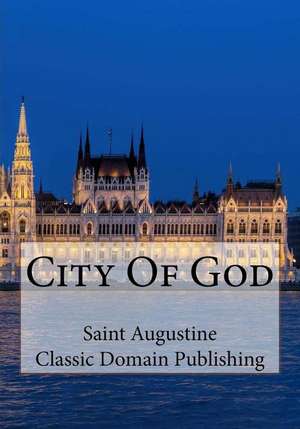City of God
Autor Saint Augustine of Hippo, Classic Domain Publishingen Limba Engleză Paperback
Preț: 212.79 lei
Nou
Puncte Express: 319
Preț estimativ în valută:
40.72€ • 42.51$ • 33.70£
40.72€ • 42.51$ • 33.70£
Carte disponibilă
Livrare economică 15-29 martie
Preluare comenzi: 021 569.72.76
Specificații
ISBN-13: 9781517567422
ISBN-10: 1517567424
Pagini: 684
Dimensiuni: 178 x 254 x 35 mm
Greutate: 1.17 kg
Editura: CREATESPACE
ISBN-10: 1517567424
Pagini: 684
Dimensiuni: 178 x 254 x 35 mm
Greutate: 1.17 kg
Editura: CREATESPACE
